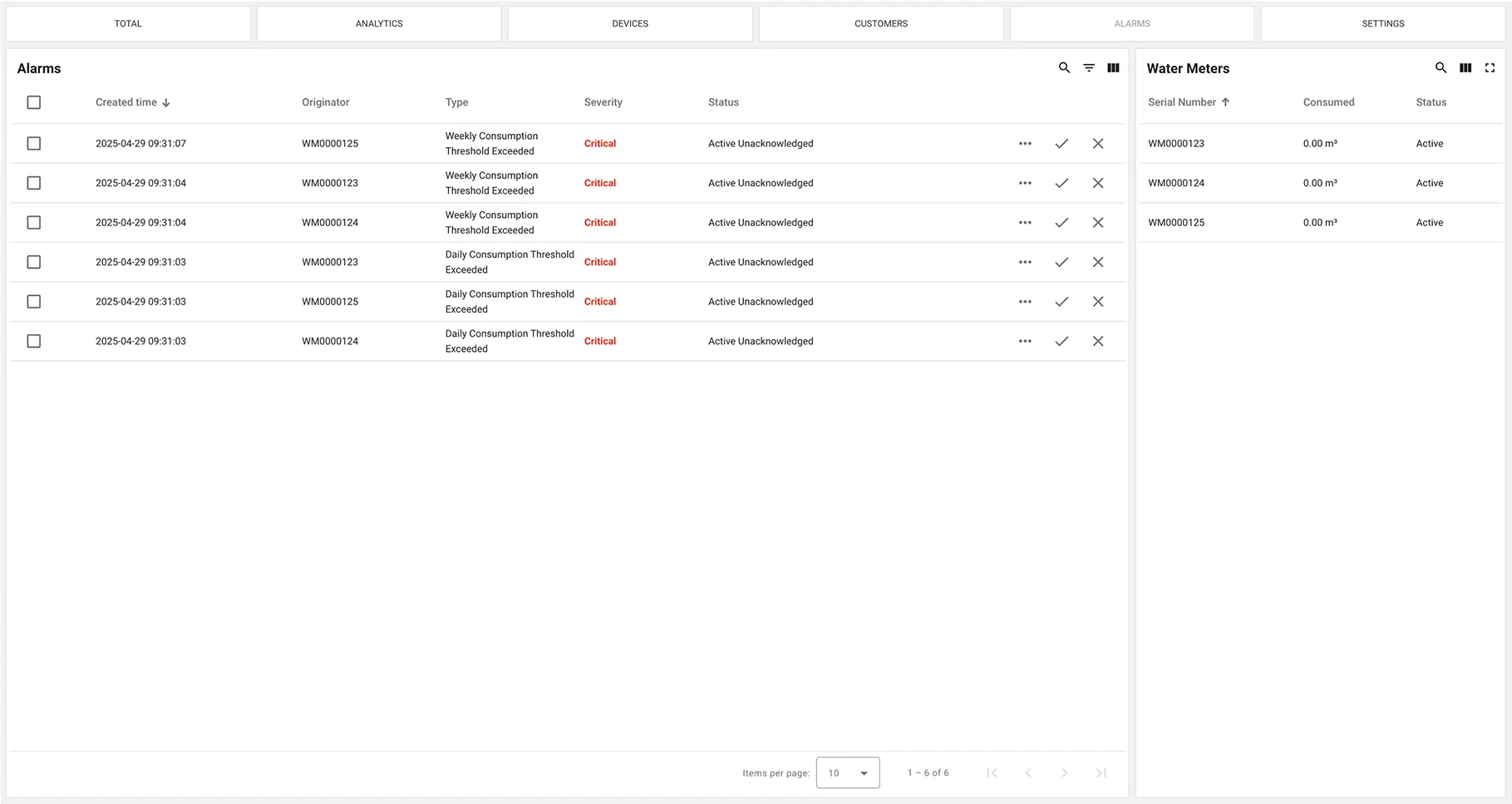Water metering
Water is one of our most critical resources, and managing its distribution and consumption is key for sustainable urban development, utility cost control, and infrastructure maintenance. For this purpose, the ThingsBoard platform is an ideal choice, offering powerful capabilities for real-time monitoring, alarms, visualization, and analytics.
Traditional water metering methods often fall short in providing real-time data, accurate billing, and predictive maintenance insights. By leveraging connected sensors and intelligent dashboards, organizations can unlock powerful insights into water usage, detect anomalies like leaks, and automate alarm systems. At the core of these solutions is ThingsBoard, a flexible IoT platform enabling the collection, processing, and visualization of telemetry data from water meters in real time.
This ThingsBoard-powered water metering solution provides complete real-time visibility into water usage, instant response to anomalies, and valuable analytics for long-term infrastructure planning. Scalable across municipalities, residential complexes, and commercial facilities, it offers a powerful tool for smart and efficient water resource management.





Solution structure of water metering use case
ThingsBoard seamlessly integrates with IoT-enabled water meters that collect real-time data on consumption, temperature, and battery level, sending it over wireless networks such as LoRaWAN, NB-IoT, and LTE for processing.
The platform stores this data, applies intelligent rules to trigger alerts, and visualizes everything through intuitive dashboards for immediate operational insights.
Dashboard structure of water metering solution
The ThingsBoard water metering dashboard is structured into dedicated states, each focusing on a key aspect of system monitoring, control, and analysis. Below is a breakdown of each state with its purpose and content:
Applications of water metering: versatility across industries
IoT-based water metering is not limited to utility companies. The same architecture and approach can be repurposed across a wide range of sectors:
Municipal water services
By using IoT-based water metering, municipalities can automate meter readings and billing processes, gain insight into consumption trends across entire cities, and react instantly to issues such as leaks or overuse.
Smart buildings
Water metering in smart buildings enables facility managers to fine-tune plumbing infrastructure, minimize waste through real-time monitoring, and improve the overall experience and sustainability for occupants.
Agriculture & irrigation
Farmers can leverage real-time data to optimize irrigation schedules, reduce unnecessary water usage, and improve crop yields while maintaining environmental responsibility.
Industrial facilities
Industries benefit from accurate water monitoring to stay compliant with strict environmental standards and to manage utility costs more effectively through predictive consumption insights.
Hospitality & resorts
Hotels and resorts can monitor water usage across various zones or guest areas to implement sustainable practices, reduce operating costs, and engage guests in eco-conscious initiatives.
Municipal water services
By using IoT-based water metering, municipalities can automate meter readings and billing processes, gain insight into consumption trends across entire cities, and react instantly to issues such as leaks or overuse.
Industrial facilities
Industries benefit from accurate water monitoring to stay compliant with strict environmental standards and to manage utility costs more effectively through predictive consumption insights.
Smart buildings
Water metering in smart buildings enables facility managers to fine-tune plumbing infrastructure, minimize waste through real-time monitoring, and improve the overall experience and sustainability for occupants.
Hospitality & resorts
Hotels and resorts can monitor water usage across various zones or guest areas to implement sustainable practices, reduce operating costs, and engage guests in eco-conscious initiatives.
Agriculture & irrigation
Farmers can leverage real-time data to optimize irrigation schedules, reduce unnecessary water usage, and improve crop yields while maintaining environmental responsibility.
Summary of water metering solution
With a low-code approach, intuitive dashboards, and comprehensive alerting mechanisms, ThingsBoard serves as a cornerstone for digital transformation in water resource management. Whether you're scaling for a city or optimizing a single facility, this solution adapts to your needs— one drop at a time.
ThingsBoard advantages
ThingsBoard protects your data with industry-standard encryption algorithms like RSA and ECDSA. Secure communication is ensured via TLS (TCP) and DTLS (UDP). Role-based access control and audit logs further enhance platform security.
Visualize data with interactive, multi-state dashboards—no coding needed. Use built-in charts, gauges, maps, tables, and control widgets. Customize every detail via advanced settings or custom widget bundles. Real-time, low-latency updates supported via embedded web-sockets.
Connect devices directly to the platform via the following built-in protocols: HTTP, CoAP, MQTT, LwM2M, and SNMP. Connect devices in your local network to the cloud using ThingsBoard Gateway via Modbus, BLE, BACnet, OPC-UA, and other protocols.
ThingsBoard allows you to define app logic using a drag-and-drop rule chain designer. Its scalable Rule Engine uses message queues like Kafka or AWS SQS for durable, reliable data processing. You can handle data within the engine or forward it to external systems.
ThingsBoard supports high-availability cloud and on-prem deployments via Kubernetes or bare-metal. Its components scale horizontally and handle 18K+ vehicles and 5K+ devices in prod.
ThingsBoard provides UI and API to manage tenants, customers, users, devices, and assets. Single tenant may have multiple tenant administrators and millions of devices and customers. It also offers out-of-the-box support of OTA updates for your smart meters.